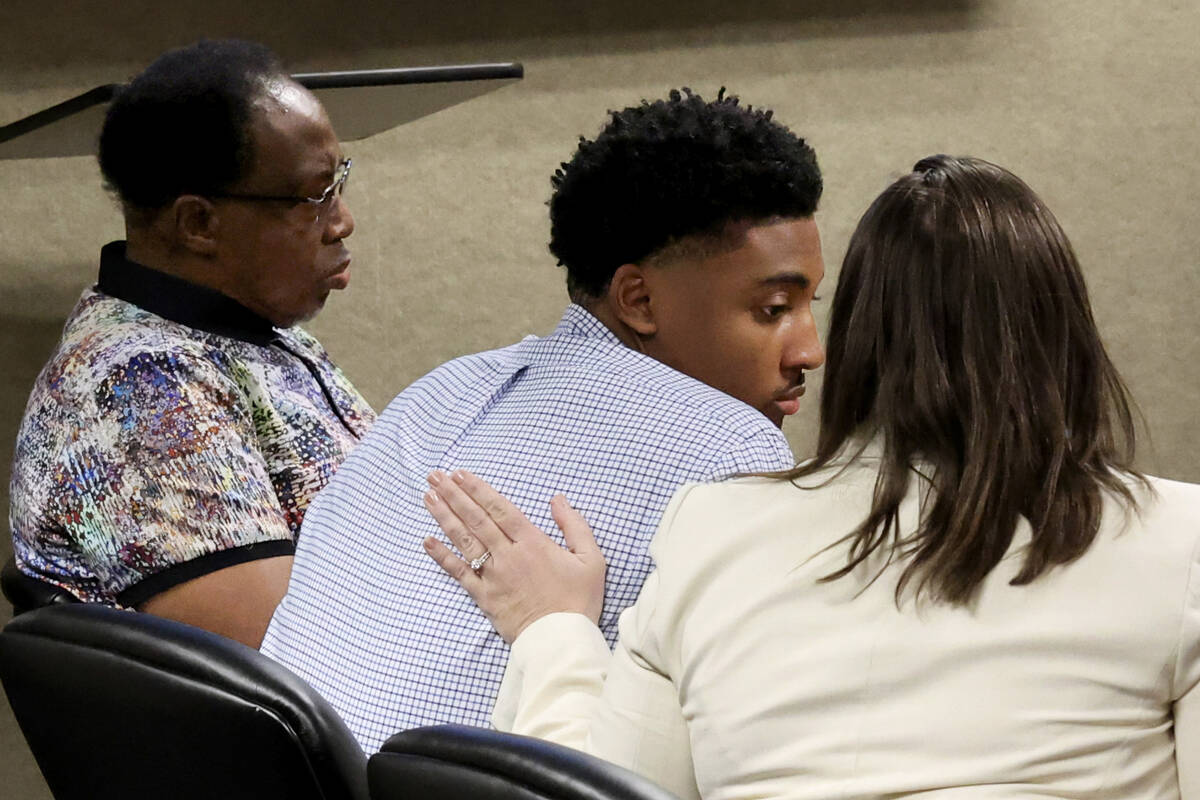Jury awards $15M to family of man killed by ex-Bishop Gorman star in crash

A jury awarded $15 million Tuesday to the family of the man killed by a former Bishop Gorman basketball standout in a 2020 crash.
Zaon Collins, who was a star UNLV recruit and is now a Fresno State junior, crashed into a car driven by Eric Echevarria, 52, and previously pleaded guilty to reckless driving resulting in death and vehicular manslaughter.
He was sentenced to three months in jail and three years of probation in 2023 after pleading guilty but ended up spending 56 days in jail.
Echevarria’s wife and son sued Collins in 2021, alleging wrongful death and negligence. Their attorney, Ramzy Ladah, asked jurors to award them $35 million plus punitive damages in closing arguments Monday. The jury opted against awarding punitive damages but found that Collins was negligent and that his negligence was a cause of Echevarria’s death.
Collins’ attorney, Stephanie Zinna, argued that total damages should be about $2.9 million and that Collins, who was speeding, and Echevarria, who turned in front of Collins, both made “human errors.”
The jury found that Echevarria was not negligent.
“We’re happy to see the Echevarria family get justice in the civil case that they didn’t see in the criminal case,” Ladah said. The jury sent a message that they would not tolerate reckless driving, he added.
Bradley Johnson, who represented Collins’ father, said the jury’s verdict would allow both families to move on.
Zinna declined to comment on the verdict.
Questions about victim’s fault
It was also hard for jurors to decide whether or not Echevarria was partially negligent, according to foreperson Michele Grant.
Some jurors thought Echevarria was at fault because he did not yield the right of way and turned into Collins’ path, Grant said.
“We initially were thinking maybe 10, 15, 20 percent should be Eric’s fault,” she said. “But the majority of us felt like there wasn’t enough evidence. They didn’t present any evidence. It was just conjecture.”
And, she said, if “Zaon hadn’t been going that fast, the crash wouldn’t have happened.” Ultimately, “Zaon’s speed trumped everything,” she added.
Police previously said Collins was driving 88 mph in a 35 mph zone shortly before the collision.
One juror who believed Echevarria was partially negligent changed her mind, “reluctantly, but of her own accord,” giving the jury the majority it needed to rule, the foreperson said. In the final tally, six jurors said Echevarria was not negligent and two said he was, according to Grant.
Juries are not required to be unanimous in civil trials. When the jury was polled, all members confirmed what was read in court was their verdict.
Another point of disagreement was the issue of punitive damages, Grant said. She wanted to award punitive damages but said fellow jurors “felt like he’s being punished enough.”
Other members of the jury declined to comment.
Marijuana issues
Prosecutors previously said Collins’ system had 3.0 nanograms per milliliter of THC, the compound that gives marijuana its high, when the legal limit was 2.0 nanograms per milliliter. But a Metropolitan Police Department forensic scientist told a grand jury that there was not enough research to know when Collins consumed marijuana.
Grand jurors declined to indict him on a DUI charge.
To award punitive damages, Ladah said, the civil jury would have had to find Collins willfully consumed marijuana and was over the legal limit.
That was a challenge in Collins’ case.
“He’s young,” the attorney said. “The toxicology is a difficult issue. It’s hard to prove, especially with marijuana.”
Joseph Chu, an attorney who also represented the plaintiffs, previously told jurors that Collins claimed he only used marijuana days before the crash when a friend gave him gummies that, unbeknownst to him, contained the drug. But Chu said scientific testimony indicated that Collins used marijuana hours before the crash.
Zinna said in closing arguments that her client did not show signs of impairment other than red eyes and pointed out the grand jury’s decision not to indict.
Grant said jurors were confused because the DUI charge was dropped, but they were not told why. Collins did not seem to be impaired at the time of the crash, she said, but the numbers indicated he was.
“There just wasn’t enough about: ‘did he do drugs or not?’ ” Grant said. “We just weren’t quite sure if honesty was there, let’s just put it that way, on Zaon’s part.”
Collins’ father, Marvin Collins, will be held liable for any damages resulting from his son’s negligence, according to jury instructions read by District Judge Anna Albertson.
“I feel sorry for the kid, and I feel sorry for the dad,” said Grant. “I hate that law that makes the dad responsible because he owned the car, but we had to follow the law.”
She added: “I don’t think there are any winners in this.”
Contact Noble Brigham at nbrigham@reviewjournal.com. Follow @BrighamNoble on X.